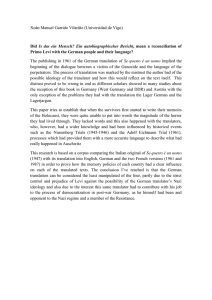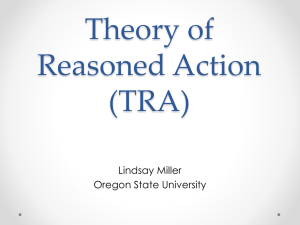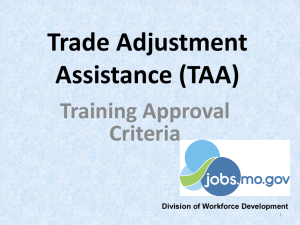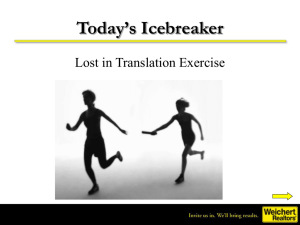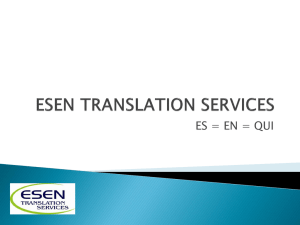BA Translation Study Plan 2015/2016
advertisement
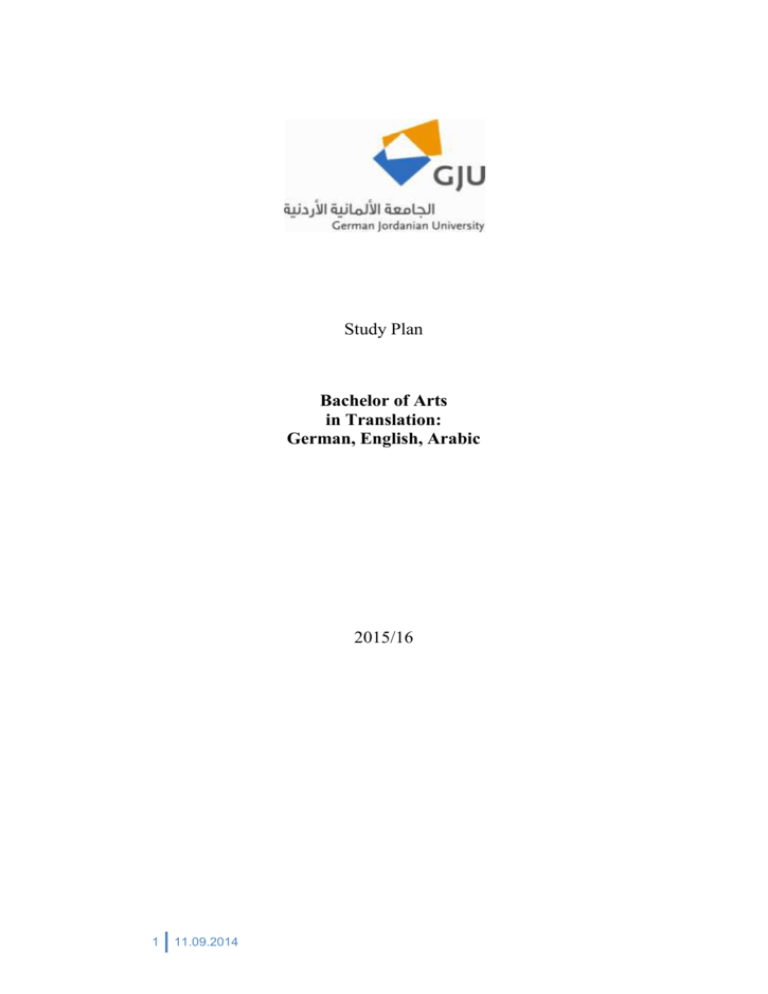
Study Plan Bachelor of Arts in Translation: German, English, Arabic 2015/16 1 11.09.2014 Program Objectives The program aims at graduating translators who have a high command of three working languages (Arabic, German and English) acquired theoretical knowledge and practical skills in translation acquired knowledge in three fields of specialized translation excellent cultural and intercultural communication skills with regard to their own culture and some cultures in which their working languages are used gained insight into the German society and culture during one semester at a German university completed a limited period of practical training in Germany Learning Outcomes Program graduates will be able to use their working languages confidently and in an appropriate way translate various kinds of texts from various fields of knowledge Carry out translation tasks which go beyond the traditional tasks of a translator, such as website localization, subtitling, etc. make appropriate use of new information technologies and translation tools Use different kinds of references properly (dictionaries, parallel texts, online information sources etc.) communicate appropriately within their own culture as well as between different cultures take on responsibility and work both individually and in teams identify problems and find ways of solving them adapt quickly to new tasks and new fields work on both the national and international level 2 1.03.2015 Framework for BA Degree (Semester Credits) Classification Credit Hours Compulsory Elective University Requirements 24 6 School Requirements 25 0 Programme Requirements 81 21 Total = 135 22 Total 30 25 102 157 1. University Requirements: 30 Credit Hours 1.1. Course No. ARB 099 ARB 100 GERS 101 GERS 102 GERS 201 ENGL 098 ENGL 099 ENGL 101 ENGL 102 ENGL 201 ENGL 202 NE 101 MILS 100 Compulsory: 24 Credit Hours Course Title Arabic 99 Arabic 100 German I German II German III English I English II English III English IV English V English VI National Education Military Sciences Total Cr. hrs. 0 3 3 3 3 0 0 1 1 2 2 3 3 24 Lecture Prerequisite 3 3 9 9 9 3 3 3 3 3 3 3 3 ARB 99 GERS 101 GERS 102 ENGL 098 ENGL 099 ENGL 101 ENGL 102 ENGL 201 - Cr. hrs. 3 3 3 Lecture Pre-requisite 3 3 3 - 3 3 - 1.2. Elective: 6 Credit Hours Course No. IC 101 SFTS 101 SE 301* EI 101 3 Course Title Intercultural Communication Soft Skills Social Entrepreneurship & Enterprises Leadership and Emotional 1.03.2015 DES 101 BE 302* TW 303 PE101 Intelligence Arts Appreciation Business Entrepreneurship Technical and Workplace Writing 3 3 3 3 3 3 - Sports and Health Total 3 6 3 - (*) Students cannot register for both SE 301 and BE 302. 2. School Requirements: 25 Credit Hours Course Course Title No. GERS202 German IV German V – Advanced GERS301 Conversation and Writing German Language Skills: GLS101 Learning Tools for Oral and Written Expression German Language Skills: Texts GLS102 in Popular Culture German Language Skills: Film GLS201 and Visual Media German Language Skills: GLS202 Business Communication German Language Skills: GLS301 Specialized Language in Business and Law Texts SL111 Introduction to Linguistics (E) Intercultural Studies (G) SL332 CS112 Computing Fundamentals Total 4 1.03.2015 Cr. hrs. 3 Lecture 9 3 0 Prerequisite GERS201 6 0 GERS202 1 3 0 - 2 3 0 GERS101 2 3 0 GERS102 2 3 0 GERS201 2 3 0 GERS202 3 3 0 3 3 0 4 25 3 3 Lab. ENGL 101 GERS202 - 3. Major Requirements: 102 Credit Hours 3.1. Program Requirements (Compulsory): 81Credit Hours Course No. GERS 302 Course Title German VI – Negotiating Skills and Application Training Arabic Functional Syntax and TRA 112 Morphology Cr. Hr. Lect. Lab. 3 6 0 3 3 0 English Functional Syntax and TRA 115 Morphology 3 3 0 TRA 121 Basic Principles of Translation 3 3 0 3 3 0 3 3 0 TRA 281 Introduction to Academic Research and Writing TRA 212 Arabic Rhetoric and Semantics English Semantics and TRA 217 Pragmatics 3 3 0 TRA 215 Contrastive Linguistics I (AR – EN) 3 3 0 TRA 216 Contrastive Linguistics II (AR – GE) 3 3 0 TRA 231 General Translation I (EN - AR) 3 3 0 TRA 232 General Translation II (AR – EN) 3 3 0 TRA 233 General Translation III (GE – AR) 3 3 0 5 1.03.2015 Prerequisite GERS 301 ARB100 ENGL 101/ SL111 ENGL 101 ENGL 102 ARB100 SL111/ ENGL 102 SL111 / ENGL 201 SL 111 / GERS 201 TRA121 / ENGL 201 TRA121 / ENGL 202 TRA 121 / GERS 201 Contemporary Issues Relating to the Arabic Language Professional Texts: Analysis TRA 313 and Writing (Arabic) TRA 234 3 3 0 ARB100 3 3 0 TRA 212 TRA 335 Translation of Media Texts (AR -EN -GE) 3 3 0 TRA 121/ GERS 201 / ENGL 201 TRA 332 General Translation IV (AR – GE) 3 3 0 TRA 233 TRA 352 Fundamentals of Literary Translation (AR -EN -GE) Lexicology and Terminology (E/A) TRA 381 Research Topics in Translation TRA 372 TRA 392 Translation in Professional Contexts (E/G) TRA 491 International Internship TRA 536 Translation of Legal Texts (AR -EN-GE) TRA 582 Research Colloquium TRA 583 B.A. Thesis Total 6 3 3 0 3 3 0 3 3 0 3 3 0 12 0 36 3 3 0 3 3 3 0 0 0 81 1.03.2015 TRA 121/ GERS 201/ ENGL 201 ENGL 201 TRA 281 GERS 201 / ENGL 201 GERS 302 TRA 121/ GERS 201/ ENGL 201 TRA 381 TRA 381 3.2. Program Requirements (Electives): 21 Credit Hours Two language courses (semester abroad) Course No. TRA 401 TRA 402 Cr. hrs. Lect. Prerequisite German Language Course I 1 2 GERS 302 German Language Course II 1 2 GERS 302 Course Title Three of the following courses (semester abroad): Course No. Course Title Cr. hrs. Lect. 3 3 3 2 2 2 TRA 433 Translation GE-AR TRA 434 Translation GE-EN TRA 435 Translation AR - GE Prerequisite - Two of the following courses (semester abroad): Course No. TRA 461 TRA 462 TRA 463 TRA 464 TRA 472 Course Title Cr. Hr. Culture Studies Germany Culture Studies GB Culture Studies USA Culture Studies Arab World Special Topics in Translation 2 2 2 2 2 Lect. Prerequisite 2 2 2 2 2 - Elective: One of the following courses in specific fields of translation Course No. Course Title TRA 537 TRA 534 TRA 535 7 Cr. hrs. Lect. Prerequisite Translation of Scientific and Technical Texts (AR-EN- GE) 3 3 TRA 491 Interpreting 3 3 TRA 491 Special Topics in Research 3 3 TRA 491 1.03.2015 Elective: One of the following courses Course No. Cr. hrs. Course Title TRA 541 TRA 540 TRA 545 TRA 546 Lect. Prerequisite Desktop Publishing 3 3 Audiovisual Translation and Electronic Translation Tools 3 3 English Discourse Analysis 3 3 Sociolinguistics 3 3 ENGL 102 ENGL 102 ENGL 102 ENGL 102 Study Plan Guide for the Bachelor Degree in Translation; German, English, Arabic First Year First Term Course No. Course Title Cr. hrs. Lect. Lab Prerequisite ARB100 Arabic 3 3 0 GERS 101 German I German Language Skills: Learning Tools for Oral and Written Expression 3 9 0 Placement Test - 1 3 0 - 1/2 3 0 Placement Test 3 3 0 ENGL 101 4 3 3 - 15/16 24 3 GLS 101 ENGL102/201/202 English IV, V, VI Introduction to Linguistics (E) Computing fundamentals SL111 CS112 Total 8 1.03.2015 First Year Second Term Course No. GERS 102 ENGL 201/202 GLS102 TRA 112 TRA 115 TRA 121 NE301 Course Title German II English V, VI German Language Skills: Texts in Popular Culture Arabic Functional Syntax and Morphology English Functional Syntax and Morphology Basic Principles of Translation (E) National Education Total 9 1.03.2015 Cr. hrs. Lect. Prerequisite 3 GERS101 9 2 3 ENGL102 2 3 GERS101 3 ARB 100 3 ENGL 101/ SL111 3 3 ENGL 101 3 3 - 15/ 27 3 3 19 Second Year First Term Course Course Title No. GERS German III 201 German Language Skills: Film and GLS 201 Visual Media ENGL English VI 202 TRA 212 Arabic Rhetoric and Semantics Lect. Prerequisite 3 9 GERS 102 2 3 GERS 102 2 3 ENGL201 3 3 3 3 3 3 3 3 University Requirement Elective I 3 3 ARB 100 SL111/ ENGL 102 SL111 / ENGL 201 TRA 121 / ENGL 201 - Total 19/ 30 TRA 217 English Semantics and Pragmatics Contrastive Linguistics I (AR – TRA 215 EN) TRA 231 General Translation I (EN – AR) 10 Cr. hrs. 1.03.2015 22 Second Year Second Term Course Course Title No. GERS German IV 202 German Language Skills: Business GLS 202 Communication Contrastive Linguistics II (AR – TRA 216 GE) Cr. hrs. Lect. Prerequisite 3 9 GERS 201 2 3 GERS 201 3 3 TRA 232 General Translation II (AR – EN) 3 3 TRA 233 General Translation III (GE – AR) 3 3 SL 111 / GERS 201 TRA 121 / ENGL 202 TRA 121 / GERS 201 3 3 ARB100 3 3 ENGL 201 20 27 Contemporary Issues Relating to the Arabic Language Introduction to Academic Research TRA 281 and Writing (E) Total TRA 234 11 1.03.2015 Third Year First Term Course Course Title No. GERS German V – Advanced 301 Conversation and Writing German Language Skills: GLS 301 Specialized Language in Business and Law Texts Cr. hrs. Lect. Prerequisite 3 6 GERS 202 2 3 GERS 202 TRA 335 Translation of Media Texts (ENAR-GE) 3 3 TRA 121/ GERS 201 / ENGL 201 TRA 313 Professional Texts: Analysis and Writing (Arabic) 3 3 TRA 212 SL 332 Intercultural Studies (G) 3 3 GERS 202 TRA 352 Fundamentals of literary Translation (AR-EN-GE) 3 3 University Requirement Elective II 3 3 Total 20 24 12 1.03.2015 TRA 121/ GERS 201 / ENGL 201 - Third Year Second Term Course Course Title No. GERS German VI – Negotiating Skills 302 and Application Training TRA 335 General Translation IV (AR – GE) Cr. hrs. Lect. Prerequisite 3 6 GERS 301 3 3 TRA 233 TRA 372 Lexicology and Terminology (A/E) 3 3 ENGL 201 TRA 381 Research Topics in Translation Translation in Professional TRA 392 Contexts (E/G) MILS Military Science 100 3 3 3 3 ENGL 201 GERS 201 / ENGL 201 3 3 18 24 Cr. hrs. Lecture Prerequisite Total - Academic semester in Germany Fourth Year First Term Course No. Course Title TRA 401 TRA 402 TRA 433 TRA 434 TRA 435 TRA 461 TRA 462 TRA 463 TRA 464 TRA 471 13 Two German Language Courses: German Language Course I German Language Course II Three courses from these areas: Translation GE-AR Translation GE-EN Translation AR -GE Two courses from these areas: Culture Studies Germany Culture Studies GB Culture Studies USA Culture Studies Arab World Special Topics in Translation Total 1.03.2015 1 1 2 2 GERS 302 GERS 302 3 3 3 2 2 2 - 2 2 2 2 2 15 2 2 2 2 2 14 - Internship in Germany Fourth Year Second Term Course Course Title No. TRA 491 Cr. hrs. International Internship Lecture Lab 36 Prerequisite GERS 302 12 0 Cr. hr. Lect. Prerequisite 3 3 TRA 372 Fifth Year First Term Course Course Title No. TRA Translation of Legal Texts 536 (EN- AR- GE) Elective: One of the following courses in specific fields of translation TRA 537 TRA 534 TRA 535 Translation of Scientific and Technical Texts (AR-ENGE) 3 3 TRA 491 Interpreting 3 3 TRA 491 Special Topics in Research 3 3 TRA 491 Elective: One of the following courses TRA 541 TRA 540 TRA 545 TRA 546 14 Desktop Publishing 3 3 ENGL 102 Audiovisual Translation and Electronic Tools 3 3 ENGL 102 English Discourse Analysis 3 3 ENGL 102 Sociolinguistics 3 3 ENGL 102 1.03.2015 TRA 582 TRA 583 Research Colloquium 3 3 TRA 381 B.A. Thesis 3 0 TRA 381 15 12 Total 15 1.03.2015 Course Descriptions BA Translation: German, English, Arabic School Requirements (25 Credit Hours) GLS 101 – German Language Skills: Learning Tools for Oral and Written Expression Contents: In this course, students become acquainted with several tools for learning a foreign language; especially programs that are available online: Apart from commonly known tools, this course introduces vocabulary programs such as Anki and Quizlet, online dictionaries based on authentic texts and corpora as well as the e-learning plattform Moodle. Students do not only get to know these tools, they also apply them in oral and written language production. Competencies: Students know a variety of learning tools and how to use them efficiently in their language learning and practice. They have the ability to work together in a group on basic projects, researching meanings of words, producing meaningful sentences, dialogues and other text structures. Thus, they obtain basic oral and written skills relevant to everyday life in Germany. GLS 102 – German Language Skills: Texts in Popular Culture Contents: This course gives the students an introduction to German culture through simple texts such as song lyrics, poems, comics, etc. Students learn about German history and culture through these popular texts. Competencies: Studying song lyrics and other texts from popular culture, students will obtain an easy and interesting access to German history and culture. They improve their listening, reading, and pronunciation skills in various tasks based on songs. Apart from dealing with the texts, students can carry out projects about certain artists, writers, or cultural phenomena in general, which they can later present to the class in a basic presentation – another skill to be trained in this course. GLS 201 – German Language Skills: Film and Visual Media Contents: In this course, German society and culture is studied through German films from various epochs. Students are also introduced to the German visual media in general: the various television channels, Internet sites, magazines, etc. Competencies: Film clips are presented with subtitles, so that students improve their listening skills as well as their vocabulary. Based on the films, students learn how to write short summaries and characterizations of protagonists. They also apply language in creative ways, through several creative writing tasks. Furthermore, students also practice their speaking skills, performing several of these film scenes in the class room. They gain knowledge about visual media in Germany and know about the most important media institutions and personalities. GLS 202 – German Language Skills: Business Communication 16 1.03.2015 Contents: In this course, students develop their language skills in a business context. Starting with written correspondence – business letters, E-mails, Invoices, etc. – students later apply business language also in oral situations: planning a business meeting on the telephone or presenting business statistics in a presentation. Competencies: Students acquire specific linguistic structures that can be applied in formal business letters. They learn about the form of such documents and how to address business partners and clients. While acquiring these formal writing skills, they also extend their specific business vocabulary, which they later practice in situations of oral communication. The focus is on the confident application of interactive language in the everyday life of a company. GLS 301 – German Language Skills: Specialized Language in Business and Law Texts Contents: This course provides an introduction to the different types of text common in the field of business. These are the text types that the students are most likely to deal with in their later professional life in a company. Technical vocabulary is acquired through the study of these texts and it is applied in text production tasks. Competencies: Students who complete this course know the most common text types from the field of business and law in German. They are able to analyze and write such texts, using appropriate vocabulary and expressions. They can differentiate between different registers of words and structures, as they are used in the respective text types. GERS 301 – German V – Advanced Conversation and Writing Contents: This course is divided into two parts: On the one hand, students acquire advanced speaking skills in everyday life contexts that are relevant to their stay in Germany. On the other hand, they develop the basic writing skills important especially in the context of education in Germany: summaries, reports, protocols, etc. Competencies: Students are enabled to speak about their everyday life, about their education and professional experience, they are able to solve problems through discussion, and they are able to state their opinion about certain social, political, or cultural questions. Furthermore, they develop basic text forms relevant to the context of universities Germany, using appropriate vocabulary. SL 111 – Introduction to Linguistics (E) Contents: This course provides an introduction to the study of language. It presents the fundamental topics of linguistics and introduces the analysis of the key elements of language – sounds, words, structures, and meanings. However, this introduction goes beyond the basic topics of “grammar”, which are already covered by the various language courses. Instead, this introductory course gives the students an overview of the various fields of linguistics, such as phonology, morphology, syntax, semantics, lexicography, sociolinguistics, text linguistics, pragmatics, etc. This course is taught in English. Competencies: Students are familiar with basic structures of language and their designations, the various academic areas of linguistics, as well as important questions of linguistic research. 17 1.03.2015 They acquire the most important concepts for linguistic analysis. Furthermore, they develop their knowledge in group work, where they study concepts, structures, and texts, which they are able to present to the class. They also practice basic academic text forms, such as protocols and summaries, accompanying the course. SL 332 – Intercultural Studies (G) Contents: This course is designed as a space for intercultural encounters between Jordanian students (those who will spend the following year in Germany) and German exchange students. Students from both countries exchange practical information about their countries that is relevant to the everyday life of exchange students. They discuss and develop projects of cultural exchange, and debate common stereotypes and possible intercultural conflicts, thus developing sensitivity for dealing with the other. This course is taught primarily in German. Competencies: Students completing this course deepen their intercultural sensitivity, reflecting stereotypes and, possibly, certain “fears” of the Other. They develop their ability to work in a group, both with students from their own culture and from the foreign culture. They obtain a deeper immersion in Jordanian/German culture, respectively, as they acquire specific knowledge about everyday life in the foreign country. They also develop their presentation skills, as they present and perform their cultural projects in class. Programme Requirements (102 Credit Hours) GERS 302 – German VI – Negotiating Skills and Application Training Contents: Just as GERS 301, this module is also divided into two parts: In the first part, students apply the language of business in situations of negotiation: from making an appointment on the phone to signing a business deal at an official meeting. The second part of this module prepares students for their stay in Germany: It considers the problems particularly foreign face when applying with a German company. Competencies: Students who complete this course are able to act professionally in a negotiation in a business setting, using appropriate linguistic structures and expressions. They know about the difficulties and particularities of the job or internship search in Germany and are able to compose a Curriculum Vita in a meticulous way. They know how to present themselves in a job interview. TRA 112 – Arabic Functional Syntax and Morphology Contents: This course on Arabic grammar covers the morphological and syntactic rules of the Arabic language, and provides a thorough and systematic overview of Arabic grammar. Students will gain a comprehensive understanding of the basic and complex rules of morphology and syntax of the Arabic language. Students will be provided with needed instruction to read and write Arabic correctly. It covers the system of inflections, arrangements of words in sentences, clauses, and phrases, and correct formation of word order. The course covers the morphological patterns and forms, as well as the system and coordination of rules that define the grammatical structure of the Arabic language. 18 1.03.2015 Competencies: The goal of this course is to teach students about the different aspects of syntax, and employing their knowledge in grammar in the practical application of the translation process. TRA 115 – English Functional Syntax and Morphology Contents: This course provides a general survey of the assumptions and techniques of the analysis of syntactic and morphological structures. Syntax provides students with the analysis of sentences in terms of categories and functions in the phrasal level and sometimes sentential level. Morphology studies the word structure, processes of affixation and derivation. Relevant processes are also studied as they pertain to changes of word structure. It also covers rules of word formation like compounding, blending, back- formation, acronyms, abbreviations, etc. Competencies: The syntax part of this course aims at introducing students to the categories and principal structures of English Syntax, in addition to training them how to recognize and analyze these categories and structures. Furthermore, they will be provided with an explicit and consistent descriptive method and terminology. Additionally, students should be able to identify types of sentences in terms of complexity and to describe nominal, adverbial and adjectival clauses in terms of type, structure, and transformations that operate on them. In terms of Morphology it is expected to enable students to master the rules of word- formation, distinguish between the types of morphemes (derivational and inflectional), distinguish between morphemes, phonemes, allomorphs and allophones, and to understand the relationship between syntax and morphology. TRA 121 – Basic Principles of Translation This language-independent introduction to the basic theoretical and methodological principles and concepts of translation draws on a functional approach that explains why source texts may have to be translated in different ways if so required by a translation brief. It is a practice-oriented approach which aims at preparing the students for professional translating and interpreting activities. It deals with communicative functions in texts and translations, different translation types fulfilling different communicative purposes, and includes basic concepts of communication and text linguistics. TRA 212 – Arabic Rhetoric and Semantics Contents: This course aims to acquaint translation students with the role of modern approaches to literary critique in complementing the rhetoric set forth by old linguistic schools. The course identifies the foundations of Arabic rhetoric and its development, and explains its different sections. It also focuses on analyzing the differences that cannot be revealed by word to word translation, the connotative and denotative meanings of lexicons, and identifying phenomena such as antonyms. Competencies: The objective of this course is to explain the methods used by Arab linguistics in seeking beauty in the literary text, and the use of the Arabic rhetoric in specifying, analyzing and evaluating figurative language in texts. The goal is to equip translation students with the knowledge needed to convey a target text that complies with the semantics of the source with minimal loss. 19 1.03.2015 TRA 215– Contrastive Linguistics I (AR – EN) This course aims at raising students' awareness of translation-relevant differences and common features between Arabic and English with regard to grammar and language use. The course will deal with syntactic and stylistic aspects of translation. More specifically, the course will conduct a comparative and contrastive study of the salient syntactic, lexical and stylistic structures of English and Arabic, and set up the syntactic, lexical and stylistic processes that should be applied when translating from English into Arabic and vice versa. It will also take into account text linguistic issues. TRA 216– Contrastive Linguistics II (AR – GE) This course aims at raising students' awareness of translation-relevant differences and common features between Arabic and German with regard to grammar and language use. The course will deal with syntactic and stylistic aspects of translation. More specifically, the course will conduct a comparative and contrastive study of the salient syntactic, lexical and stylistic structures of German and Arabic, and set up the syntactic, lexical and stylistic processes that should be applied when translating from German into Arabic and vice versa. It will also take into account text linguistic issues. TRA 217– English Semantics and Pragmatics Contents: This course is an introduction to the field of semantics and pragmatics. It introduces the students to the basic components of semantics and pragmatics terms such as, reference vs. sense, utterance vs. sentence, literal vs. non literal meaning, prepositions, metaphor, irony, metonymy, synecdoche, hyperbole, and litotes. Students will practice translating various sentences that carry different or similar meanings and try to pinpoint the factors that lead to similarity of diversity of meaning. In other words, the course is a practical training of students in the field of semantic translation. Competencies: After completing this course, students will develop an understanding of the relationship between language and meaning of word, sentence and utterance level. Additionally, they will learn semantic theories about the understanding of different aspects of meaning in words, how they can be described, and how grammar and syntax contribute to meaning. Also, they will learn pragmatic theories about how language users achieve their goals in verbal interaction with others. TRA 231 – General Translation I (EN – AR) This course aims to teach students strategies and methods of translating various practicerelevant text genres for various purposes and in various styles of writing from English into Arabic. Students are also introduced to linguistic as well as cultural problems and difficulties which the translator faces in rendering a text from one language into another. Real-world projects are frequently incorporated into the classes. TRA 232 – General Translation II (AR – EN) 20 1.03.2015 This course aims to teach students strategies and methods of translating various practicerelevant text genres for various purposes and in various styles of writing from Arabic into English. Students are also introduced to linguistic as well as cultural problems and difficulties which the translator faces in rendering a text from one language into another. Real-world projects are frequently incorporated into the classes. TRA 233– General Translation III (GE – AR) This course aims to teach students strategies and methods of translating various practicerelevant text genres for various purposes and in various styles of writing from German into Arabic. Students are also introduced to linguistic as well as cultural problems and difficulties which the translator faces in rendering a text from one language into another. Real-world projects are frequently incorporated into the classes. TRA 234 –Contemporary Issues Relating to the Arabic Language Contents: Arabic has faced old and new challenges that were overcome due to the efforts exerted by the linguistic scholars over the different eras and times. This course aims to highlight some of the issues challenging Arabic language to this day, including the issues that are considered problematic to translation students, such as: terminology, the use of the vernacular language, Arabic writing, common errors, globalization, etc… Competencies: The objective of this course is to teach translation students about the negative effects of such issues in the presentation of a translated text that does not comply to the general foundations and criteria of sound translation. The course also seeks to analyze the problems faced by translation students, through identifying the problems, and then finding the best ways and methods to overcome them. TRA 281 – Introduction to Academic Research and Writing Contents: In this course, students become acquainted with the most important methods and skills for academic research and writing. They are introduced to the resources crucial to research, such as the library or specific resources available online. Competencies: Students gain access to the sources that are crucial to academic research. They develop academic writing skills and know how to quote, compile a works cited list, and avoid plagiarism. They carry out a short research project individually and present it in an appropriate way, in written form. They are able to quote and cite their resources adequately in this paper. TRA 313 – Professional Texts: Analysis and Writing (Arabic) Contents: In this seminar, students obtain an insight into professional texts from various areas, such as business, law, journalism, etc. in Arabic. This course departs from the assumption that certain types of texts, such as a newspaper article, a business report, a review, a law text, etc. have specific features, a specific language and structure. 21 1.03.2015 Competencies: Students develop a feeling for the structure and, especially, for the writing style of texts from different areas in Arabic. They are able to produce professional texts in Arabic for various purposes. Based on the knowledge they already have about similar text types in German and English, they are able to compare text types from different languages and cultural contexts. They develop their research skills in group work and present the results of their research to the class. Students learn to present their written texts in a well-formatted portfolio. TRA331– Specialized Translation (Social Sciences) In this course students learn how to translate various text genres from and into Arabic, English and German in the field(s) of social sciences they were introduced to in TRA 271. Real-world projects are frequently incorporated into the classes. TRA 332– General Translation IV (AR – GE) This course aims to teach students strategies and methods of translating various practicerelevant text genres for various purposes and in various styles of writing from Arabic into German. Students are also introduced to linguistic as well as cultural problems and difficulties which the translator faces in rendering a text from one language into another. Real-world projects are frequently incorporated into the classes. TRA 335– Translation of Media Texts (AR -EN -GE) Contents: This course is designed to familiarize students with media style, format and features. In addition, it will enhance students’ translation skills with respect to ArabicEnglish, English –German, German- Arabic and vice versa. This course is designed to tackle a wide range of mass-media texts, including press reports, interviews, political analyses, news bulletins, public speeches, etc. It aims to lay the foundations for, and to introduce students to the practice of, translation for the media, and develop their translating sense and skills in practical media translating assignments. Competencies: At the end of the course, students will be able to understand the semiotics of multimodal ‘texts’ as hybrid texts which work in cross-cultural communication and to communicate as precisely as possible the essence of both written and/or aural texts; a skill which is becoming crucial in handling the enormous inflow of information from electronic and conventional sources. Students will be to tackle a wide range of mass-media texts including press reports, interviews, political analyses, news bulletins, public speeches, etc. Special emphasis will be placed on the characteristics of the language of media, abbreviations and acronyms, political and diplomatic language, objective and sensational reporting, etc. TRA 352 Fundamentals of Literary Translation (AR -EN -GE) Contents: This course aims to train students to translate different literary texts between English- Arabic, Arabic – German, English –German, etc. It also focuses on how to deal with the peculiarities of literary texts in English, Arabic and German when being translated into the other language. Students develop translation strategies by focusing on literary genres including essays, prose, poetry, drama, testimonials and children’s literature and comics. 22 1.03.2015 Practical matters such as copyright and publication processes are tackled throughout the course. Competencies: At the end of the course, students will learn strategies for translating essays, prose, poetry, drama, testimonials and children’s literature and comics. They will become acquainted with contemporary translation theory as it relates to literary translation and to understand how to analyze the translation of a literary work. TRA 372 – Lexicology and Terminology (A/E) Contents: The aims of the course are to gain insights into systemic organization of the lexicon, its structure and relations, give an understanding of non-isomorphic relations between languages at the level of lexicon, improve skills of work with a dictionary, skills of applying theoretical principles in practice (translation), provide basic skills of practical work . Competencies: After having completed the course, students will be able to define the field and the aims of lexicology and lexicography as well as define its main terms and concepts. They will be able to analyze the formation and meaning of words and to analyze the vocabulary of a given language. In addition, they will be able to describe different types of dictionaries and types of descriptions in dictionaries and describe the meaning of words from the perspective of the mental lexicon. Also, they will describe and analyze the way in which words are acquired and stored in the mental lexicon; explain and justify the most suitable lexicographic design for a given type of word and linguistic unit. TRA 381 – Research Topics in Translation The students explore their scientific and research interests in different fields and gain practical experience in various projects related to the BA program. The course aims at developing and deepening the knowledge in selected fields closely related to translation theory and application, such as localization, adaptation, history of translation in the Arab world and the West, translation of holy books, international criteria in translation, translation methodology and others. This course is designed to help the students enhance their abilities of understanding and dealing with complex issues and challenges faced in the translation process. This course provides deeper insights into topics or specific fields of Translation Studies and serves as a preparation for the Bachelor Thesis. TRS 392 – Translation in Professional Contexts (E/G) In this course the students are prepared for the local and the international job market. They are trained in various job application methods and further develop their soft skills with a special focus on job interviews and assessments. Forms of applications and of resume writing in Arabic, German and English speaking countries are presented, discussed and produced. During field trips and meetings with experts the students are introduced to possible future workplaces and learn about common practices in their field of specialization. TRA 433 – Translation German/Arabic 23 1.03.2015 Courses provided by partner universities TRA 434 – Translation German/English Courses provided by partner universities TRA 435 – Translation Arabic/German Courses provided by partner universities TRA 461– Culture Studies Germany Courses provided by partner universities TRA 462– Culture Studies Great Britain Courses provided by partner universities TRA 463– Culture Studies USA Courses provided by partner universities TRA 464– Culture Studies Arab World Courses provided by partner universities TRA 472–Special Topics in Translation Courses provided by partner universities TRA 491 – International Internship Practical training in a German institution or company (20 weeks). TRA 534– Interpreting This course offers a language-independent introduction to the theory and methodology of interpreting. Students apply their knowledge in consecutive and liaison interpreting exercises in all working languages. TRA 535– Special Topics in Research 24 1.03.2015 This course provides deeper insights into topics or specific fields of Translation Studies on a more theoretical level. Students are introduced to recent scientific research in translation studies. TRA 536– Translation of Legal Texts (AR -EN-GE) Contents: Legal texts are often complicated and difficult to understand for the layman, which the legal translator often is. Legal translators have to work accurately and errors may have dire consequences. Naturally, this course cannot teach students to become fully-fledged legal translators. Rather, it aims to gain insight into what happens when one tries to translate texts that are very much culture specific. Furthermore, students are introduced to the theoretical problems involved in legal translation. They will explore and work with translation tools and translate a variety of legal texts such as contracts, correspondence, deeds, insurance policies, summons and court decisions. Competencies: Students will explore some of the problems of legal translation. In addition to mastering a substantial number of legal terms and expressions in Arabic, English and German, they will be trained to appreciate the intricacies of legal phraseology, subtlety and accuracy. They will be asked to translate a variety of legal texts from Arabic into English, English into German and vice versa. TRA 537– Translation of Scientific and Technical Texts (AR-EN- GE) The course focuses on translating different text-types that are related to different scientific genres, which would consequently enrich students' vocabulary in various topics. The course would enable students to write successfully in different scientific topics using correct Arabic, English and German through the translation process. Students will also be trained on how to overcome translation problems through different types of discourse. TRA 540 – Audiovisual Translation and Electronic Translation Tools This course aims to provide an introduction to the subject ranging from dubbing and voiceover to surtitling and subtitling, while offering a practical focus on professionally-oriented training in interlingual subtitling.t also provides the students with skills for effectively using translation tools. It focuses on computer-assisted terminology management, the use and construction of corpora, translation memories, localization tools, and the incorporation of machine translation programmes into the translation process. TRA 541– Desktop Publishing This course provides the students with the necessary background for using the computer and specific types of software to combine text and graphics to produce documents such as newsletters, brochures, books, etc. They will be introduced to various programmes such as Adobe InDesign, PagePlus X2, and QuarkXPress. TRA 545- English Discourse Analysis 25 1.03.2015 This course focuses on the analysis of language use in different genres of spoken and written English so that translation students become explicitly aware of the features of language used in everyday life. Students collect, transcribe, and analyze features of conversations, lectures, explanations, interviews, descriptions, and other types of speech genres while reading and discussing theoretical notions underlying language use in English. Students identify features of cohesion, involvement, discourse markers, coherence, structure, rhythm, prosody and others. TRA 546- Sociolinguistics This course provides an overview of the field of sociolinguistics – studying language in its social context and looking at how linguistic choices are associated with social and situational characteristics. The course is designed to increase students’ awareness of the ways that language and social contexts interact and develop their ability to explain some of these interactions. The approaches that will be used in considering the interaction of language and society will be drawn from related disciplines, including anthropology (the ethnography of speaking) and social psychology. TRA 582 - Research Colloquium Contents: This colloquium provides a space for students to discuss their B.A. projects as work in progress. They present their outlines, their main theses and research ideas. As a course after the exchange year in Germany, this colloquium is held in German. Competencies: Students learn how to present the ideas/results of their research in an appropriate and interesting way, accompanied by visuals and a handout. They also learn to critically discuss and evaluate their own and each other’s projects, thus improving the structure and deepening the ideas of their theses. TRA 583 -B.A. Thesis With their graduation project the students carry out scholarly work on a limited, practicerelated topic in one of various fields of translation, translation criticism or intercultural communication, applying the methodology of the discipline and using the appropriate literature. 26 1.03.2015
